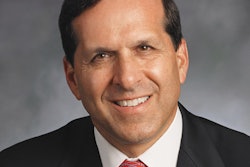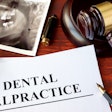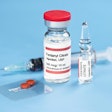
An oral surgeon in Michigan must pay $2.75 million in a medical malpractice case for reportedly injuring a 32-year-old's carotid and lingual arteries, leaving him with mouth numbness and trouble chewing, according to a press release issued by the patient's attorney.
On April 14, a jury in Macomb County 16th Judicial Circuit Court in Michigan ordered that Dr. Jeffrey Osguthorpe pay damages to patient Giorgio Webster, according to news reports. The man was rushed to the hospital in 2018 due to massive bleeding caused by Osguthorpe reportedly trying to remove a vascular lesion with a drill, according to the release from the Moss and Colella law firm in Southfield, MI.
In 2019, Webster filed a lawsuit against Osguthorpe and Summit Oral and Maxillofacial Surgery, which has five offices in Michigan and no longer lists the oral surgeon as an employee. Webster claimed to experience life-threatening consequences due to Osguthorpe's failure to properly diagnose a vascular lesion that the oral surgeon negligently removed without consent, according to the release.
"In a trial that was postponed numerous times due to the pandemic, the stakes were high for my client, who endured serious trauma at the hands of an oral surgeon who failed to follow established standard of care guidelines," Webster's attorney A. Vince Colella said in the release.
In 2018, Webster was referred to Osguthorpe for examination and removal of his lower left wisdom tooth. During his first visit, Webster underwent a panoramic x-ray. When Osguthorpe reportedly viewed the x-ray, he discovered a radiolucency near the patient's affected tooth, according to the patient's law firm.
Osguthorpe then allegedly ordered Webster undergo a cone-beam computed tomography (CBCT) scan without contrast and recommended that he have a biopsy to determine whether the lesion was cancerous. A couple of months after the patient's initial visit, he underwent the CBCT scan. The radiologist who reviewed the scan reported the imaging was "suboptimal due to a lack of IV (intravenous) contrast" and further recommended that Webster undergo magnetic resonance imaging (MRI) with IV contrast, according to the release.
However, Osguthorpe purportedly claimed that the MRI would not be beneficial and instead scheduled Webster for a lower wisdom tooth extraction and an incisional biopsy without any further diagnostics.
Five days after the man's wisdom tooth was extracted, Webster went to Osguthorpe for his scheduled incisional biopsy. After Webster was sedated, Osguthorpe allegedly chose to abandon the incisional biopsy and attempted to remove the mass, which the oral surgeon believed to be a cystic mass. Osguthorpe reportedly changed the type of procedure and the documentation for it without the patient's consent, according to the release.
While attempting to remove the mass, Osguthorpe encountered an arteriovenous malformation, or vascular lesion. As he drilled into the malformation, the oral surgeon purportedly injured the patient's carotid and lingual arteries, causing massive bleeding in his mouth.
The oral surgery practice called the paramedics, who transported Webster to the hospital. Emergency room physicians could not stop the bleeding, so Wester was intubated and airlifted to a trauma center, where he underwent an emergency embolization surgery to stop the bleeding and save his life, according to the release.
During the jury trial, Colella argued that Osguthorpe breached oral surgery standards of care by failing to obtain proper permission for the surgery, as well as proper diagnostics, including an MRI. Also, it was argued that the oral surgeon negligently entered the vascular lesion using a drill.
Osguthorpe's lawyer argued that his client did not breach standards of care, claiming an MRI with contrast was not warranted, nor was the delineation of the mass from a vascular lesion. Additionally, the defense attorney claimed that an arteriovenous malformation of the ramus was so rare, even reportedly comparing it to a unicorn, that it should not be considered as part of a differential diagnosis, according to the release.
The jury ultimately awarded Webster more than he was seeking. Webster had requested $2.63 million. To date, this verdict amount is the largest in Macomb County in 2022, according to the release.




















